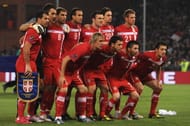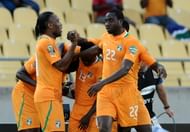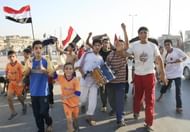War ravages nations and in most cases renders a nation incapable of participating in international sporting events. So it is all the more creditable when these countries are able to rise up from the devastating effects of war and create some truly remarkable sporting history.
Here are the top 5 war-to-victory stories starting with Afghanistan’s qualification for the cricket World Cup in 2015 yesterday.
Afghanistan qualify for the ICC cricket World Cup
Afghan cricket fans celebrate their teams victory in the match between Afghanistan and Kenya as they watch it on a big screen at the International Cricket Stadium in Kabul on October 4, 2013. War-torn Afghanistan erupted in wild celebrations as its cricket team beat Kenya to qualify for the 2015 World Cup, just 12 years after the game took hold in the wake of the Taliban’s fall.
A wave of celebrations took place across Afghanistan yesterday after their cricket team achieved the distinction of qualifying for the ICC cricket World Cup in 2015 for the very first time.
The Afghans beat Kenya by seven wickets on Friday in what was their final qualifying match in Sharjah. They dismissed the Kenyans for just 93 runs and chased down the target with ease with their captain leading the way.
Joyous fans watched the event live in a stadium in Kabul where a big screen was set up. The fans later took to the streets of the capital to celebrate and similar celebrations erupted in other cities as people gathered in public places on the occasion.
The captain of the Afghan team, Mohammad Nabi, said that the win was “a gift to a young generation”.
“I can’t express my feelings,” Nabi said. “It is a very big day in my life. I’m sure there will be huge celebrations back home. I’m happy for the people of Afghanistan and look forward to playing in Australia and New Zealand.”
NATO an allied forces, led primarily by the USA, launched an all-out war on Afghanistan in a bid to oust the ruling Taliban government which was ruled to be helping out the Al-Qaeda, the organization that claimed responsibility for the 9/11 attacks in the United States.
The war is now into its 11th year and despite assurances of a withdrawal of troops from the early years of the war, with the country’s public services and infrastructure still crippled thanks to the decade-long war.
Yugoslavia, Croatia, Serbia and Montenegro
Yugoslavia boasted a really good football team in the late eighties and early nineties and were considered dangerous opponents at international events.
Today the country does not exist while having undergone a long and arduous metamorphosis. The Serbian national team is recognized as the successor to that team after the country split into Croatia, Bosnia and Herzegovina and Serbia and Montenegro.
The civil war that ravaged the country between 1991-1999 meant that the country was banned from the 1994 FIFA World Cup in the United States and the 1996 European Championships in England.
The country qualified as Serbia & Montenegro at France’98 and made the Round of 16. They also reached the quarter-finals at Euro 2000.
Tragedy soon struck the nation again as there was another split that produced the two independent nations of Serbia and Montenegro with their respective football teams.
The split meant a disruption in the country’s football program and as a result, they did not qualify for the 2008 Euros in Austria and Switzerland.
They rebounded well though and qualified for the 2010 World Cup where they were represented as just Serbia.
Each of these splits left a huge dent in football from the region as it led to players being separated ever so frequently thanks to their changing nationalities and regional associations.
The Cote d’Ivoire football team
The Cote d’Ivoire or Ivory Coast saw two civil wars that killed and displaced thousands. The first of them began in September 2002 and lasted over two years until late 2004. Even after the end of the war, the country was split in two as the rebels held sway over the northern part while the government controlled the south.
The situation was pretty tense in 2006, yet amidst it all the Cote d’Ivoire national football team managed to qualify for the World Cup in Germany that year. So much so, that the team was actually credited for helping to bring about a temporary truce between the two warring sides.
After a few years of peace, a second civil war broke out in November 2010 and continued till April 2011. The period was marked by widespread human rights violations from both sides with the country’s citizens constantly in the line of fire.
Despite all of that, the Elephants, as the Ivorian team is popularly known, made both the 2006 and 2010 World Cups. Though they did not make it out of the group stages, they won widespread praise for their football and were popular at both tournaments.
They also made it to the final of the African Cup of Nations in both 2006 and 2012 and over the last eight years have been the top African team in the FIFA rankings more often than not.
Afghanistan football team wins the country’s first major international championship
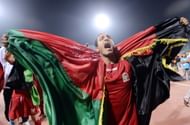
Afghanistan’s players celebrate following their victory over India in the SAFF Championship football Cup final match in Kathmandu on September 11, 2013. Afghanistan won the match 2-0
About three weeks before their cricketing brothers clinched qualification for the cricket World Cup in 2015, Afghanistan’s footballers had already done the nation proud.
The Afghans beat the much fancied Indian team 2-0 in the final of the South Asian Football Federation (SAFF) Championships in Nepal. India had come into the tournament as two-time defending champions, having won the last two editions, and were chasing a hat-trick of titles. They are also the most successful nation at the event with six trophies to their name.
So it was little surprise that Kabul and many other Afghan cities erupted with joy when news filtered in of their teams profound victory. It also gave the team and the country a semblance of retribution as they had come second to India in the previous edition in 2011.
For many hours after the memorable win, Afghans were seen dancing in the streets with joy, honking cars and firing guns.
It was a poignant moment for a nation where once its football stadiums had been used by the erstwhile Taliban government to stage executions.
Shukria Barakzai, a female Afghan parliamentarian and one of the rare women who went out on the streets to celebrate remarked: “I am proud of the Afghan team — they made the greatest victory in the Afghan history, and I am proud to be Afghan.”
Celebrations went as far as even Kandahar, a city known to be one of the most conservative in Afghanistan.
Spokesman for the Kandahar provincial governor, Javid Faisal, even tweeted: “I will not post any casualty reports for 24 hours as I am celebrating the Championship of Afghanistan.”
During the Taliban rule between 1996-2001, sports activities were severely restricted and public outpouring and celebrations on the streets were the stuff of dreams.
Iraq clinch the Asia Cup in 2007
On July 29, 2007, Iraq scripted one of the most memorable fairy-tales in sporting history. They beat Saudi Arabia 1-0 in the final to win the Asia Cup and provide a moment of great joy to their war-torn nation.
The Saudis were bidding to become the first-ever four-time winners of the event, but the Iraqis, who had become the darlings of the tournament as well as the whole world, rode a huge wave of popular sentiment to cause a major upset.
It was all the more remarkable as they had beaten two of the favourites back-to-back after getting past South Korea in the semi-finals.
That match ended goalless after extra-time and went to penalties where Iraq’s custodian Noor Sabri turned out to be the hero as he saved the fourth spot-kick from the Koreans. The fifth kick from the Koreans then hit the post to send Iraq into the final.
Younis Mahmoud scored the only goal of the final on 72 minutes to secure a first ever Asia Cup triumph for Iraq.
Few people had given the Iraqis any chance before the tournament started in the light of the war at home and with the players having suffered emotionally from the violence back home and quite a few of the players had even lost relatives in it.
Like Afghanistan, Iraq was invaded by a United States-led force, two years later in 2003; the premise of the war being the discovery of Weapons of Mass Destruction (WMD) in Iraq. It formed a part of the United States’ supposed ‘Global War on Terror’ and lasted nine years culminating with the withdrawal of US troops in 2011.
In this backdrop, the team had gotten together and united under Brazilian coach Jorvan Vieira, who had only two months to prepare a team that had players from varied ethnic backgrounds – Shi’ites, Sunnis and Kurdish players. Local infighting amongst different ethnic groups was common in Iraq at the time.
The team was forced to train and play qualifiers in neutral countries
“This is not just about football… this is more important than that,” Iraq’s Brazilian coach Jorvan Vieira told a news conference.
“This has brought great happiness to a whole country. This is not about a team, this is about human beings.”
Almost every member of the team had been touched by the war in some way or the other and played through much personal grief.
One of the tragedies of the war was that the team could not even return to Iraq with the trophy.
“I wish we could go, but you just don’t know who will kill you,” said Iraqi captain Mahmoud, who was named the best player of the tournament.
FIFA President Sepp Blatter, who was present at the final, had said that Iraq’s achievement had inspired millions and was proof of sport’s unique power to unite people in the most desperate of circumstances.
As these two fans rightly echoed through their poster, ‘War could not kill football’ !
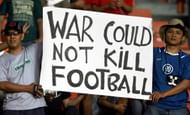
Indonesian football fans hold up a placard before the start of the Asian Football Cup 2007 final match between Iraq and Saudi Arabia at Bung Karno stadium in Jakarta, 29 July 2007. Meanwhile Iraq declared an overnight vehicle curfew in Baghdad and stepped up security as the country braced itself for celebrations and possible bomb attacks following the Asian Cup football final.
